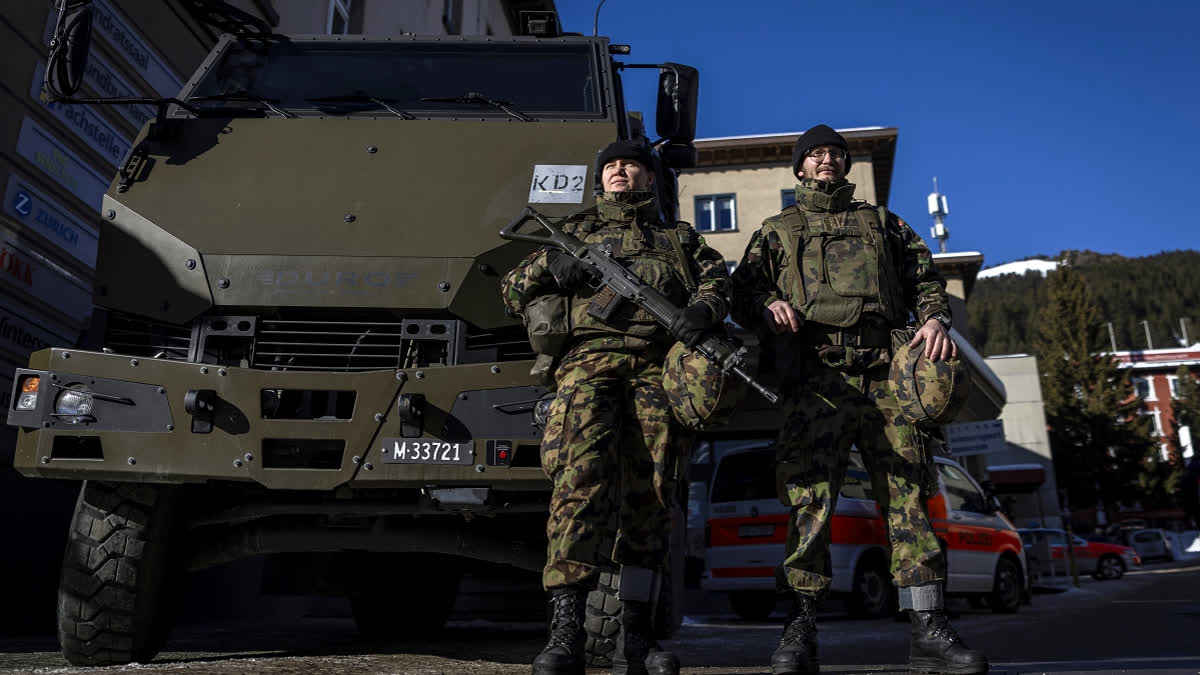Davos: This town in Europe has become synonymous with an annual gathering of the world's most powerful people, which requires heavy-duty security coverage.
Nearly 5,000 Swiss army personnel, including those equipped with the latest gadgets like drones and AI-powered tools, have taken over this small skiing resort town to ensure the safety of its high-profile visitors for the next week and to ensure the successful completion of a rare annual confluence of the biggest names in the world, from business to government to civil society to art and culture and many others.
The thousands-strong army deployment is actually adding to the large number of police and civilian personnel tasked with securing this small Alpine resort town.
The Swiss Armed Forces said in a statement that in 2025, the armed forces will once again support the civilian authorities in the canton of Graubunden in carrying out security tasks related to the annual meeting of the World Economic Forum (WEF).
Swiss Parliament has approved the deployment of a maximum of 5,000 soldiers on these civil affairs support operations from 2025 until 2027. The 2025 WEF meeting will be held from January 20 to 24, but the Swiss Army's mission lasts from January 14-30.
Air traffic over Swiss, Austrian and Liechtenstein territory within a radius of 25 nautical miles (approximately 46 km) of the centre of Davos will be restricted. Approaches to and departures from regional airfields and heliports must follow special rules and procedures developed by the Swiss Air Force and the Federal Office for Civil Aviation.
Only specified visual flight routes may be flown. All these flights will be subject to authorisation; accreditation of both pilots and aircraft is required for authorisation. Even after accreditation, a request must be made to the Air Force for every flight. The Air Force will then decide whether to grant or refuse permission on requirements and security considerations.
The Swiss Air Force will support the civilian authorities with air transport and surveillance flights using helicopters, propeller planes and combat aircraft. Therefore, a considerable increase in military air movements even beyond the canton of Graubünden is to be expected.
As air traffic includes not only helicopters and aeroplanes, all other airspace users are also subject to restrictions that came into force on January 17, 2025.
Davos is estimated to have a permanent population of about 10,000 people but is frequented throughout the year by tourists, including skiing enthusiasts, during ski season. However, it is the week of the World Economic Forum Annual Meeting when it sees the maximum footfalls and the population multiplies.
Given the high-profile nature of the event, beginning Monday, the security will be both discreet and visible and comprise snipers, drone jammers, regular frisking and checking, and round-the-clock patrol. In addition to army personnel, there is a huge number of policemen and women, and support staff running into thousands. And there is no less number of tourists, it being a skiing season.
The Air Force has also been tasked with monitoring and securing the airspace. Besides, it will use its helicopters to transport people protected under international law on behalf of the Swiss federal government. These flights should not be confused with the private helicopter taxis for business giants, which will also be plentiful.
The persons protected under international law mostly include high-ranking officials such as presidents and members of the government of foreign states, who can benefit from VIP transport by the Air Force. This group also includes high-ranking members of international organizations such as the UN or the EU, including the UN Secretary-General and the President of the EU Commission.
Given the importance of this meeting for Switzerland and its people, all cantons in Switzerland participate in the inter-cantonal police operation to maintain security and protect people and property.
Authorities maintain that there are no general travel restrictions, and Davos is accessible by public transport or by car. However, precautionary personal, vehicle, and baggage checks will be carried out on all access roads.
According to Swiss government data, more than 2,500 leaders from business, politics, science and culture will be staying in Davos from January 20-24, including 200-300 internationally protected persons, such as heads of state and government, ministers, and high-level representatives of international organisations.
The cost ceiling for security at the WEF Annual Meeting 2025 is set at CHF 9 million. As in previous years, the federal government, together with the WEF Foundation and its other partners (Canton of Graubunden, commune of Davos), will contribute to the costs of WEF Annual Meeting security measures for the period 2025-2027 as part of a three-tier finance model.
These are split between the funding partners as follows: WEF: 50 per cent; federal government: 25 per cent; Canton of Graubunden: 21.67 per cent; Davos: 3.33 per cent. Klosters will contribute CHF 100,000 towards Davos's share of the costs.
The deployment of the armed forces in support is funded through the normal DDPS budget. Overall, the cost of deploying troops at the WEF Annual Meeting is much the same as that incurred by the same battalions when on regular training.
The annual budget for deployments related to the WEF Annual Meetings from 2025 to 2027 is CHF 32 million. In recent years, deployment costs have been under budget (2023: CHF 23.46m, 2024: CHF 26.84m).
The World Economic Forum is a foundation. In the financial year from July 2023 to June 2024, it reported a total revenue of CHF 440 million. There was no surplus during this period.



